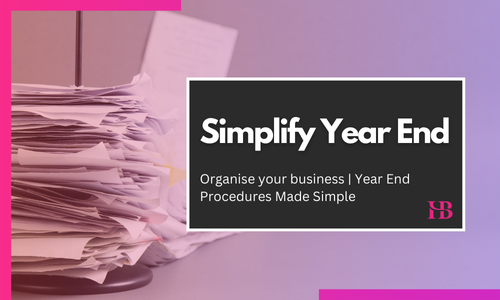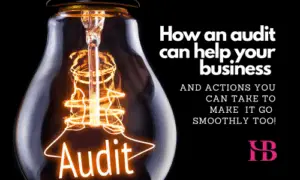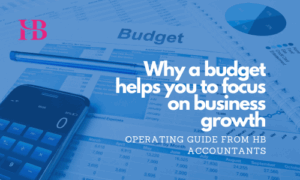Getting ready for the end of your tax year might appear daunting but don’t dread it, consider embracing it. This is an excellent opportunity to organise your business. This is easier when you have a great relationship with your accountant and you keep good records.

As the end of the financial or tax year approaches, a frequent question we hear is “What do I need to give you?”
If you are a sole trader or a limited company, the records your accountant needs are similar. Your accountant needs detail of your business income and expenses to calculate your business profit. Below is a simplified checklist along with the usual documents needed:
- Bank statements for your business accounts
- Stock valuation
- Purchase invoices and receipts
- Records of sales/rental/investment income
- Payroll documents
- Credit card statements
- Financial agreements
- Loan statements
- Petty cash records
- Any other expenses not directly paid by the business
- Assets and equipment acquired during the year
- Assets sold, scrapped, or disposed of during the year
- Copies of VAT returns submitted throughout the year
- Mileage logs
- Dividends disbursed to shareholders or drawings taken
Here are five common issues that waste time and money when preparing clients’ financial statements and tax returns
- Poor communication
- Missing information
- Inconsistent and incorrect coding
- Bank reconciliation issues
- Processing errors with invoicing
Get Your Affairs in Order
Having current and precise information is a game changer. Some business owners choose to buy bookkeeping software or employ a professional bookkeeper. If you’re a small or new business, you may choose to use a spreadsheet.
Bookkeeping for SMEs
Managing basic bookkeeping on a spreadsheet involves inputting and categorising transactions. When a transaction occurs, follow this process to record and categorise it:
- Get a record of the transaction: Every time a transaction takes place, you’ll need a record to refer to for the relevant information that you’ll record within your Excel bookkeeping system. This record may be a credit or bank statement, the information in your PayPal account, or a receipt from a cash payment.
- Enter the date: Based on the record you have, you’ll enter the date the transaction was recorded under the appropriate column.
- Describe and categorise the transaction: Next, you’ll enter the relevant account under the appropriate column. You’ll fill in what the transaction was, how much it was, and then the category.
What Will Your Accountant Check?
- Your bank account – is your account fully reconciled and does it match your actual bank statement balance? If not, the error needs to be located and corrected. It’s crucial to have an accurate picture of what’s going in and out of your bank account, otherwise you could spend money you don’t have. Worst case scenario, you could get fined by the Tax Office for inadequate record-keeping.
- Invoices, bills and payments received – have all those that fall within the current tax year been entered, approved and banked? Do you have any outstanding invoices that need to be collected or bills that need to be paid?
- Expenses claims – have you claimed every legitimate business expense you can? They will track down those receipts and take into account non-cash items, such as business mileage and use of your own home. Every sum you claim in expenses is a deduction from your profits, which in turn means less tax.
- Paperwork – they will ensure there is the hard evidence that will back up your return, such as bank and credit card statements, and supplier statements of accounts.
You can provide all the mentioned information digitally. Please be aware that the lists provided are not exhaustive, and your specific circumstances will determine the relevant information needed.
Simplified Year-End Procedures
It’s financially beneficial to keep track of your expenses because you can subtract them from your declared profit to HMRC, lowering your tax bill. Additionally, it aids in managing cash flow and enables you to make better-informed decisions regarding your spending.
After providing your accountant with the information required, it is now their turn to finalise your business’ year-end.
Basis Period Reform: Changes for Unincorporated Businesses
From 6 April 2024, there’s a new way of allocating business trading income for tax purposes called “basis period reform.” This affects sole traders and partnerships, excluding those with a year end on 31 March or 5 April.
Are Limited Companies affected by the Basis Period Reform?
Limited Companies are not affected. Initially, this change may increase tax liability, as the 2023/24 tax calculation will cover a longer period. However, provisions like overlap relief and spreading additional profits over five years can mitigate this. Still, expect higher tax bills for the next few years. Consider changing your accounting year end to 31 March to minimize the impact, though it might not be suitable for all businesses.
The effects of this reform vary depending on your situation. At HB Accountants, we can assist in assessing its impact on cash flow, potential higher tax bands, and help you with strategies for minimising the damage.
Year end checklist pre 5 April 2025
- Maximise use of tax rates, tax bands and allowances
- Assess allowances available for all family members
- Review profit extraction strategy in family companies
- Plan for cash flow impact of basis period reform (unincorporated businesses)
- Take advantage of the 2024/25 ISA allowance
- Claim higher rate repayments under Gift Aid
- Review pension plans
- Update wills and estate planning as required
- Contact us ahead of 5 April 2025 for maximum tax efficiency for the new tax year (24/25)
The information contained above is for general guidance purposes only. Whilst every effort has been made to ensure the contents are accurate, please note that each individual has different circumstances and it is essential that you seek appropriate professional advice before you act on any of the information contained herein. HB Accountants can accept no liability for any error
Read Our Latest Blogs Below
- HMRC Advisory Fuel Rates (AFRs) from 1st June 2025
 HMRC has published the latest Advisory Fuel Rates (AFRs) which apply from 1 June 2025. AFRs are the official rates used when reimbursing employees for business mileage in company cars. They’re reviewed every quarter (February, May, August and November) and adjusted in line with fuel prices.
HMRC has published the latest Advisory Fuel Rates (AFRs) which apply from 1 June 2025. AFRs are the official rates used when reimbursing employees for business mileage in company cars. They’re reviewed every quarter (February, May, August and November) and adjusted in line with fuel prices. - How an audit can help your business (and actions you can take to make it go smoothly too!)
 An audit may be a legal requirement for your business but a well managed audit can also boost your business growth and ensure that it is operating in the best way possible.
An audit may be a legal requirement for your business but a well managed audit can also boost your business growth and ensure that it is operating in the best way possible. - Why a budget helps you to focus on business growth
 Are you looking for clarity over the future direction of your business? Do you want to know the actions you should take in order to grow your business? Then consider taking time to create a budget for your business.
Are you looking for clarity over the future direction of your business? Do you want to know the actions you should take in order to grow your business? Then consider taking time to create a budget for your business. - How a SME Owner Can Create More Time
 SME owners and managers – are you part of the one in five small and medium-size enterprise managers that work on average an additional 3 hours a day on a regular basis? Or one of the 33% that claim that there just aren’t enough minutes in a day to get everything completed? (The Independent study … Continue reading
SME owners and managers – are you part of the one in five small and medium-size enterprise managers that work on average an additional 3 hours a day on a regular basis? Or one of the 33% that claim that there just aren’t enough minutes in a day to get everything completed? (The Independent study … Continue reading - A New Academic Year for our Student in Zambia
 As the new academic year unfolds in Zambia, we are delighted to share an update about our sponsored student, Getrude. Currently in her second year at Chalimbana University, Gertrude is studying Business Administration in Accounting and Finance.
As the new academic year unfolds in Zambia, we are delighted to share an update about our sponsored student, Getrude. Currently in her second year at Chalimbana University, Gertrude is studying Business Administration in Accounting and Finance.

